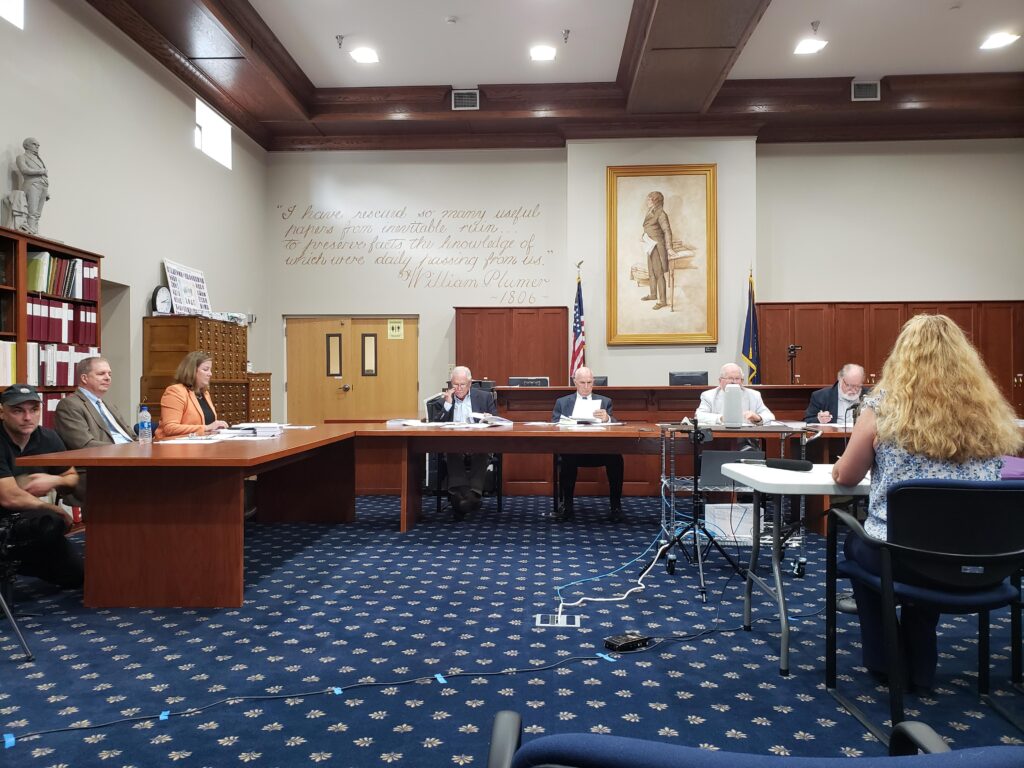On Wednesday, August 24, 2022, an attack on pro-secession legislators failed. The New Hampshire Ballot Law Commission heard a complaint by someone who clearly doesn’t like the idea of secession. Karen Steele of Atkinson filed the complaint, claiming that the fourteen New Hampshire State Representatives who sponsored and/or voted for* CACR32 are now ineligible to serve in office.
The legislators under consideration were given advance notice that the Commission would be hearing Ms. Steele’s complaint on the 24th. Word leaked out to the New Hampshire pro-independence community. Members organized a rally in front of the State Archives Building prior to the scheduled hearing.
Pro-Secession Rally in Concord
Around twenty pro-secession activists and several journalists attended the rally. Representatives from the organizations Foundation for New Hampshire Independence, NHExit.org, and FreeKeene were present. There was also a video crew from Boston and a reporter from WMUR. Alu Axelman, President of FNHI, gave a short but impassioned speech. He pointed out that, despite numerous offers on his part, he hasn’t found a single person who opposes New Hampshire independence willing to publicly debate him on the matter.

Shortly before 1:00PM, the crowd moved into the conference room. Despite moving a large table out of the way to make more space, and setting up more chairs, the hearing was standing room only.
Ballot Commission Hearing
Ms. Steele’s complaint was third on the agenda. She brought a thick stack of printed material, some of which she shared with the commissioners and some of which she read from. The basis of her argument was that, according to the 14th amendment to the U.S. Constitution, the state legislators who had supported CACR32 had “engaged in insurrection or rebellion… or given aid or comfort to the enemies” of the United States. She read aloud Section 3 of the 14th Amendment as follows:
No person shall be a Senator or Representative in Congress, or elector of President and Vice-President, or hold any office, civil or military, under the United States, or under any State, who, having previously taken an oath, as a member of Congress, or as an officer of the United States, or as a member of any State legislature, or as an executive or judicial officer of any State, to support the Constitution of the United States, shall have engaged in insurrection or rebellion against the same, or given aid or comfort to the enemies thereof. But Congress may by a vote of two-thirds of each House, remove such disability.
14th Amendment to the U.S. Constitution

The commissioners asked if any of the fourteen legislators named in the complaint were present and wished to speak. Only one, Rep. Matthew Santonastaso , R-Rindge, indicated that he did. Rep. Santonastaso wore a T-shirt that said “It’s Not You It’s Me” with an image on the front of New Hampshire separated from the rest of the United States, and the URL NHExit.US on the back. Santonastaso spoke briefly, saying that he didn’t feel he had done anything wrong. Furthermore, he felt that supporting CACR32 was supporting his oath of office.
The commissioners then asked the Assistant Attorney General for his interpretation of the 14th Amendment and how it applied to this situation. He said he had done some research ahead of time. It was fairly clear that the terms “insurrection” and “rebellion” were generally considered to refer to violence. He also said there is very limited modern case law regarding this situation. Most secession-related cases date back to the period immediately following the Civil War in the 19th century.
The Verdict is In
The commissioners then debated the matter amongst themselves. The point was made fairly quickly that the Ballot Law Commission was created for a very specific purpose. And that purpose doesn’t include constitutional interpretation. It was also noted that following the standard procedures to amend the state constitution hardly qualifies as violence. Furthermore, interpreting the mere discussion of something as potentially violent is “a very slippery slope”. One commissioner asked who exactly are the “enemies” that the legislators are accused of aiding? It didn’t take the commission long to unanimously vote on a motion to dismiss Ms. Steele’s claim.
At the end of the complaint’s hearing, one commissioner made a point of stating that he felt comfortable in speaking for the entire commission that they find the idea of New Hampshire seceding “abhorrent”.
Footnote on Legislative Terminology
*Vote to ITL” is the state government’s terminology for *not* voting against a committee’s recommendation. The State and Federal Relations and Federal Affairs committee had issued a recommendation of “Inexpedient to Legislate” aka ITL. This is how it’s worded when a committee wants to reject or kill a bill. When the full legislature voted on CACR32, a vote of “Yes” meant “in agreement with the committee’s recommendation”. That meant that legislator wanted to kill the amendment. A vote of “No” meant “not in agreement with the committee’s recommendation”. That meant that legislator wanted to send it on its next step in the legislative process.
It should be noted that voting “No” on the committee recommendation for CACR32 doesn’t necessarily indicate support for New Hampshire independence. What it indicated was a willingness to let the citizens of New Hampshire vote on the matter. According to WMUR’s coverage of yesterday’s hearing, Rep. Peter Torosian, R-Atkinson said he only co-sponsored CACR32 to send a ”shot across the bow” of the Federal government. He “would never have put my name on that if I thought it had a chance to pass”.
See our article for more information about the original committee hearing on CACR32.
The post Attack on pro-secession legislators failed appeared first on New Hampshire Secession.



